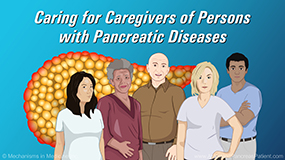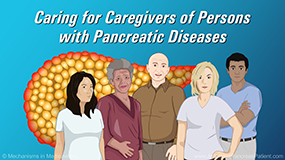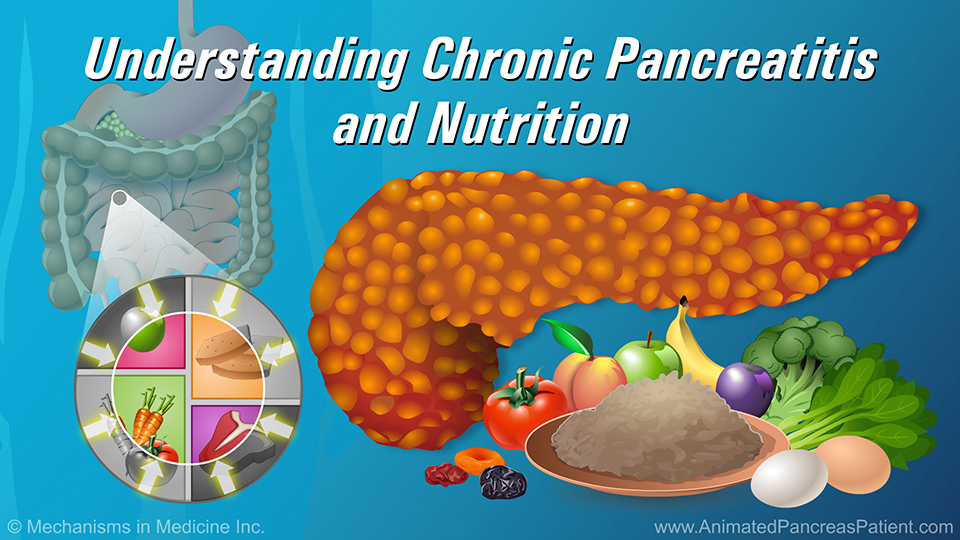Caring for Caregivers of Persons with Pancreatic Diseases
*This slide show represents a visual interpretation and is not intended to provide, nor substitute as, medical and/or clinical advice.
Pancreatic disease caregivers
It is challenging to care for someone with a disease of the pancreas, such as pancreatitis or pancreatic cancer.
This animation tells you about some common ways that caregivers cope. It also offers you more effective alternatives for self-care.
Who is a caregiver?
What makes you a caregiver? You are a caregiver if you regularly help with the daily and medical needs of a spouse, family member, or someone else with pancreatic disease.
Being a caregiver can be deeply rewarding. But it can also be very stressful, creating burdens and even health problems for you.
Be aware that you need care
Caregivers often struggle with specific problems, including depression, anxiety, financial challenges, and possible health problems of their own.
Depression and anxiety
Depression can include feeling extremely sad, exhausted, or helpless. You might have difficulty sleeping or feel you have nowhere to turn.
Anxiety can cause these feelings too. Anxiety might come from worrying about the person you care for. Will they get better? What will happen if they get worse? You might also feel anxious about daily caregiving tasks.
Financial challenges
Paying for medicines, buying extra supplies, or taking time off work can be a challenge. Talk to your workplace about family leave. You can also ask a social worker or nurse for information on possible sources of financial help for medicines or other items.
Your own health problems
Exhaustion can be physical as well as mental. Being a caregiver can include getting up at night, doing extra chores, and more. If you have a health condition of your own, it’s important to take care of it. The healthier you are, the more physical and emotional energy you have for caregiving.
Better ways to cope with caregiving
So, what are the best ways to cope with being a caregiver?
Positive coping strategies: Adapting to the situation
Positive coping strategies include adapting – that means adjusting to the difficult situation as it is.
For example, if your loved one has cancer, you can take part in discussing treatments and learning about the best treatment and lifestyle options. You can do practical things like getting a special parking permit if your loved one has difficulty walking very far into the store or doctor’s office.
Adapting to your changed circumstances can help empower you and your loved one.
Positive coping strategy: Planning
Planning is another positive strategy. Being organized can reduce anxiety, and keeping track of spending and costs can help you avoid financial surprises.
Ways to plan include creating a file for health information and making a list of things you and your loved one need help with. You can also make a list of people to help.
Positive coping strategy: Getting support
Joining a caregivers’ support group or network, seeing a counselor, or participating in an online community can also reduce anxiety. Join your friends for social activities, if possible. Some friends may be uncomfortable with your loved one’s illness, but others will want to support you.
You can also get ideas from other caregivers, including about finances and practical support. You might even learn something that helps your loved one feel better.
Positive coping strategy: Getting help
Getting help with daily tasks is a helpful strategy.
Ask friends and neighbors to help you with simple chores and tasks, or hire helpers for jobs like cleaning and yard work if you can afford it. You might also hire a caregiver for some health needs. These things can help you feel less overwhelmed, get some rest, and take care of your own health.
Positive coping strategy: Replacing negative thoughts with positive ones
It’s easy to think about how stressed you feel.
Instead, try replacing negative thoughts with positive ones, like, “We find something to enjoy in every day,” or “I’m doing the best I can.”
Exercise can help you feel more positive by releasing stress. You can yell or scream in private to release negative energy, sing to boost your mood, or wear a piece of clothing you enjoy. All these strategies can put you in a better mood.
Positive coping strategy: Accepting the situation
Accepting and dealing with the fact that your loved one has a long-term disease or serious cancer can help you cope. It can also help to simply accept that sometimes, you will feel very sad.
Positive coping strategy: Find religious or spiritual hope
Find spiritual hope and support by practicing your faith, visiting special places, spending time in nature, or talking with spiritual leaders for comfort and perspective. These things can help you feel less depressed and alone.
Meditation has been shown to provide stress relief even when not associated with a religious practice.
Positive coping strategy: Have a sense of humor
Caregiving can be hectic, messy, or crazy at times.
Laughing at things that seem silly, or finding humor in situations, can help get you through difficult times. Reach out to friends to share a laugh. True friends will respond and help you feel more normal.
How are you coping?
Do you use any of the positive strategies shown here?
You might want to try some new ones. Research shows that positive coping strategies help both caregivers and patients feel better, and patients do better at sticking to treatment.
Finally, don’t forget to reward yourself occasionally for a job well done! Take yourself out for a cup of coffee or lunch, get a massage, or visit a friend. Doing things that make you feel good will lift your spirits and help you take better care of your loved one.
This slide show provides
practical tips and
positive coping strategies for
caregivers to keep in mind when caring for a person with a disease of the pancreas, such as
pancreatitis or
pancreatic cancer. Being a caregiver can be deeply rewarding. But it can also be very stressful, creating burdens and even health problems for you. View this slide show to learn how you can stay healthy and manage the stress that comes with caring for someone else. These actions will help you be an effective caregiver for a longer period of time.
-
Share with family and friends:
Click here to take our SURVEY
Your feedback is important to us! We will use your feedback to develop future areas of content about pancreatic diseases which will help other patients, caregivers and families.



















